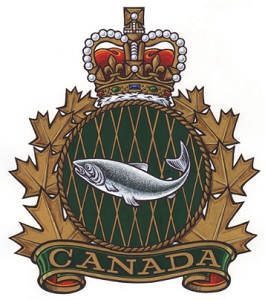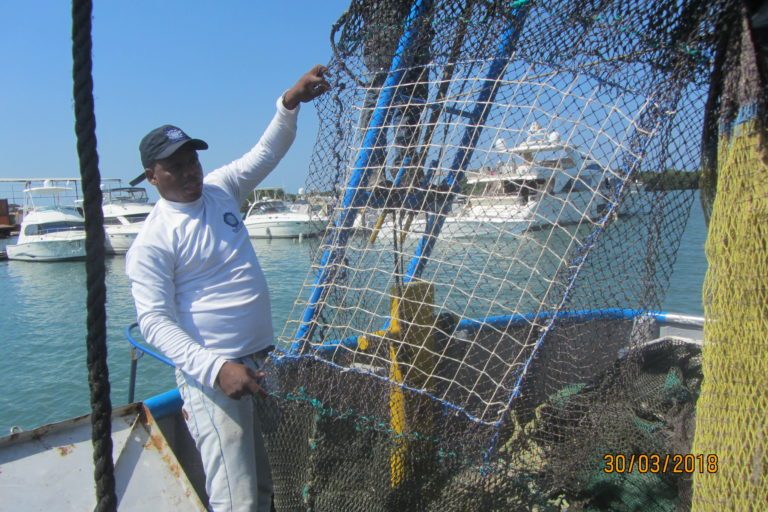Tag Archives: elver eel
Mi’kmaw fishers say DFO officers left them to walk for hours at night after seizing boots, phones
 Two Mi’kmaw elver fishermen say they were forced to walk in sock feet for hours along a rural Nova Scotia highway in the middle of the night last week after they were detained by federal fisheries officers who took their boots and phones before releasing them. Blaise Sylliboy and Kevin Hartling, who assert they have a treaty right to fish for the lucrative baby eels despite this year’s season being cancelled, were joined Tuesday morning by dozens of protesters outside the Department of Fisheries and Oceans building in Dartmouth, N.S. “When we were walking, there’s times I’m like, ‘Man, if we stop, we’re going to die,’ because our feet were just soaked,” said Hartling. more, >>click to read<< 06:22
Two Mi’kmaw elver fishermen say they were forced to walk in sock feet for hours along a rural Nova Scotia highway in the middle of the night last week after they were detained by federal fisheries officers who took their boots and phones before releasing them. Blaise Sylliboy and Kevin Hartling, who assert they have a treaty right to fish for the lucrative baby eels despite this year’s season being cancelled, were joined Tuesday morning by dozens of protesters outside the Department of Fisheries and Oceans building in Dartmouth, N.S. “When we were walking, there’s times I’m like, ‘Man, if we stop, we’re going to die,’ because our feet were just soaked,” said Hartling. more, >>click to read<< 06:22
Put rules in writing to fix Maritime elver fishery’s enforcement problem, say businesses
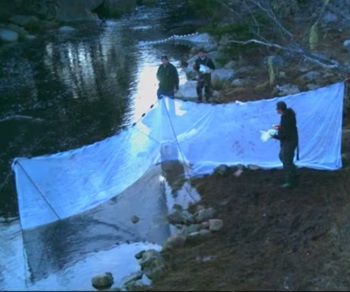 Representatives of the $45-million Maritime elver fishery are calling on the federal government to implement enforceable regulations for moderate livelihood fishing by Indigenous people. They told a Senate committee in Ottawa Thursday the failure to define or regulate moderate livelihood rights by the Department of Fisheries and Oceans (DFO) is one reason for the uncontrolled harvest of baby eels on dozens of rivers in Nova Scotia and New Brunswick. “Among these poachers are First Nations unwilling to work with DFO to access the fishery under a banner of moderate livelihood rights, backed by organized crime, specifically biker gangs and foreign smuggling networks. Our once peaceful industry has recently faced violent disruption,” said Genna Carey, a commercial licence holder speaking on behalf of the Canadian Committee for a Sustainable Eel Fishery, an industry group. more, >>click to read<< 09:29
Representatives of the $45-million Maritime elver fishery are calling on the federal government to implement enforceable regulations for moderate livelihood fishing by Indigenous people. They told a Senate committee in Ottawa Thursday the failure to define or regulate moderate livelihood rights by the Department of Fisheries and Oceans (DFO) is one reason for the uncontrolled harvest of baby eels on dozens of rivers in Nova Scotia and New Brunswick. “Among these poachers are First Nations unwilling to work with DFO to access the fishery under a banner of moderate livelihood rights, backed by organized crime, specifically biker gangs and foreign smuggling networks. Our once peaceful industry has recently faced violent disruption,” said Genna Carey, a commercial licence holder speaking on behalf of the Canadian Committee for a Sustainable Eel Fishery, an industry group. more, >>click to read<< 09:29
With the elver harvesting season on the line, some Mi’kmaw chiefs are scrambling for options
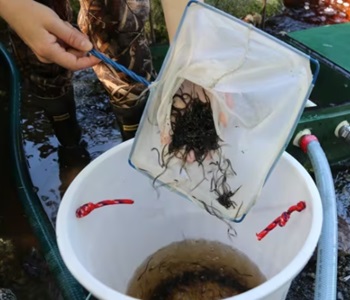 Fisheries Minister Diane Lebouthillier has said that due to violence, threats, widespread unauthorized harvesting and potential harm to elver stocks the season should be cancelled because it was “not possible to have a safe and sustainable elver fishery.” Key elements of the Mi’kmaw proposal include monitoring total allowable catches, enhancing traceability using GPS and responsibly managing the fishery. It would also double their total allowable catch. Gerald Toney, fisheries co-lead for the Assembly of Nova Scotia Mi’kmaq Chiefs, said communities still need to discuss future plans and whether harvesters will continue to fish even with a ban in place. more, >>click to read<< 08:01
Fisheries Minister Diane Lebouthillier has said that due to violence, threats, widespread unauthorized harvesting and potential harm to elver stocks the season should be cancelled because it was “not possible to have a safe and sustainable elver fishery.” Key elements of the Mi’kmaw proposal include monitoring total allowable catches, enhancing traceability using GPS and responsibly managing the fishery. It would also double their total allowable catch. Gerald Toney, fisheries co-lead for the Assembly of Nova Scotia Mi’kmaq Chiefs, said communities still need to discuss future plans and whether harvesters will continue to fish even with a ban in place. more, >>click to read<< 08:01
Wolastoqey fishers say proposed elver fishery shutdown infringes on treaty rights
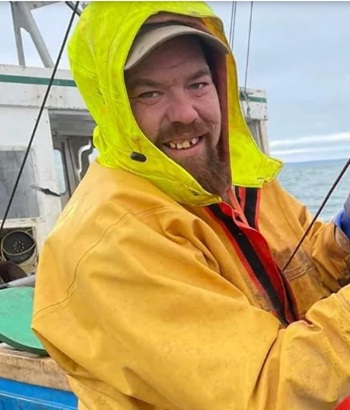 Some Wolastoqey fishers say closure of the fishery for baby eels, or elvers, this year will infringe on their treaty rights and impact their right to earn a moderate livelihood from fishing. Last week, Fisheries and Oceans Canada (DFO) issued letters to commercial licence holders that it will not renew licences ahead of the elver season that typically starts in late March. DFO shut down the elver fishery in New Brunswick and Nova Scotia last April because of conservation and safety concerns, after reports of violence and overfishing by unauthorized harvesters. Tyler Sabattis, a lobster and scallop fisherman, said he got into elver fishing last year to earn extra income for his family and community in Bilijk (Kingsclear First Nation), near Fredericton. more, >>click to read<< 09:34
Some Wolastoqey fishers say closure of the fishery for baby eels, or elvers, this year will infringe on their treaty rights and impact their right to earn a moderate livelihood from fishing. Last week, Fisheries and Oceans Canada (DFO) issued letters to commercial licence holders that it will not renew licences ahead of the elver season that typically starts in late March. DFO shut down the elver fishery in New Brunswick and Nova Scotia last April because of conservation and safety concerns, after reports of violence and overfishing by unauthorized harvesters. Tyler Sabattis, a lobster and scallop fisherman, said he got into elver fishing last year to earn extra income for his family and community in Bilijk (Kingsclear First Nation), near Fredericton. more, >>click to read<< 09:34
Canada plans crackdown as trade data shows elver exports were 4 times the legal catch in 2022
 Fisheries and Oceans Canada (DFO) plans to crack down on the illegal fishery for baby eels, also known as elvers, in the Maritimes next year by creating separate possession-and-export licences to track the catch from river to airport. The effort comes as newly reported trade data shows a huge surge in elver exports leaving Canada, reaching an all time high of 43 tonnes in 2022 — four times the authorized Canadian total allowable catch. To avoid a repeat of the chaos and deter the illegal trade, DFO wants new regulations in place by March 2024, ahead of the spring elver migration and fishing season. photos, more, >>click to read<< 14:32
Fisheries and Oceans Canada (DFO) plans to crack down on the illegal fishery for baby eels, also known as elvers, in the Maritimes next year by creating separate possession-and-export licences to track the catch from river to airport. The effort comes as newly reported trade data shows a huge surge in elver exports leaving Canada, reaching an all time high of 43 tonnes in 2022 — four times the authorized Canadian total allowable catch. To avoid a repeat of the chaos and deter the illegal trade, DFO wants new regulations in place by March 2024, ahead of the spring elver migration and fishing season. photos, more, >>click to read<< 14:32
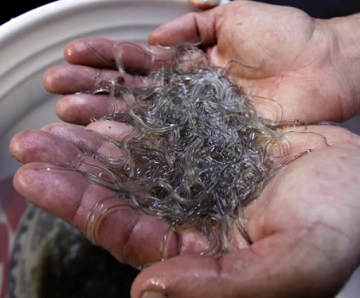
Quota transfer to Maritime First Nations prompts Federal Court challenge
Commercial licence holders in the lucrative Maritime baby eel fishery have launched a Federal Court challenge over the decision to take 14 per cent of their quota and give it to Indigenous groups in 2022. The quota of baby eels, or elvers, was worth millions of dollars. It was reallocated without compensation to fulfil First Nation treaty rights to fish. The elver redistribution raises broader questions about what licence holders in other commercial fisheries can expect if their allocations are cut in favour of First Nations. >click to read< 09:23
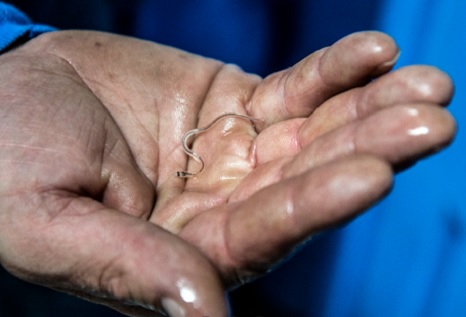
Lincoln County a Growing Force in Maine’s Elver Fishery
The elver fishery is the second most valuable fishery in Maine despite its brief season, lasting only 11 weeks from March 22 to June 7. Recent years have seen annual income generated by the fishery exceed $20 million. And from a per pound perspective, it easily tops lobsters as the most lucrative fishery in the state, and possibly in the country. The demand for elvers is driven by the overseas market where baby eels are grown to size in specially designed aquaculture facilities for use in Asian cuisine. Once mature, the eels are also processed and shipped back to the U.S. where they are a popular dish on sushi menus. While still in its infancy, U.S. based eel aquaculture is poised to be another factor in the fishery. photos, >click to read< 15:24
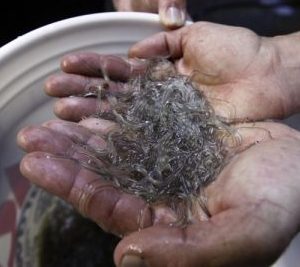
Canada considers quota cut on commercial elver eel fishery to increase Mi’kmaw access
The federal government is considering cutting the commercial elver quota by 14 per cent this year to increase Mi’kmaw access to the lucrative Maritime fishery for baby eels. Ottawa has cancelled negotiations to buy out commercial licence holders. The bargaining was an attempt to make room for Indigenous participation without increasing fishing effort. The Department of Fisheries and Oceans notified the industry of its intentions late last month. In recent years, Mi’kmaw bands have been demanding a piece of the action. That has led to numerous riverside confrontations between Mik’maw, claiming a treaty right, and DFO officers. >click to read< 09:34 Nova
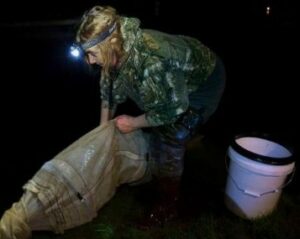
Thirteen winners out of 2,600 hopefuls hit the 2022 Maine elver fishing lottery
In 2020, elvers remained one of the most valuable species harvested in Maine, with harvesters earning $5,067,521. And that was despite a decrease in per-pound value of more than $1,500. In 2021, Maine’s elver fishery rebounded on the strength of a per pound value of more than $1,800. The overall landed value of more than $16 million was an increase of more that $10 million over the previous year. Now, the elver season is ready to begin again March 22, with the Maine Dept. of Marine Resources identifying 13 fishermen who won the elver harvest letter. More than 2,600 people applied for a 2022 harvester license. >click to read< 09:45
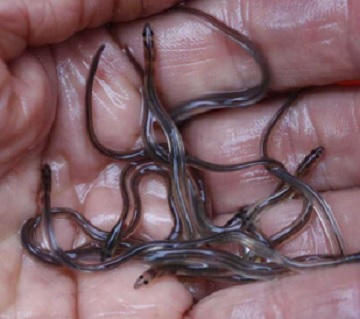
Elver eels rocket back up in value!
Maine is home to the U.S.’s only significant fishery for the baby eels, which are called elvers, and it’s taking place right now. Prices tanked last year due to disruption to the worldwide economy caused by the onset of the coronavirus pandemic. This year, the fishery is experiencing a return to normalcy. The tiny, wriggling fish are worth $1,634 per pound to fishermen, the Maine Department of Marine Resources reported on Monday. They’ve been worth between $1,300 and $2,400 per pound every year since 2015, except last year, when they were worth $525. >click to read< 11:22
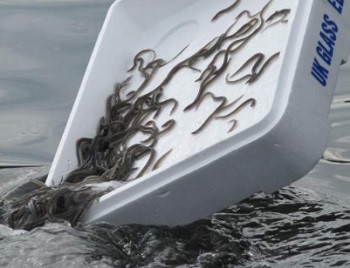
Businessman who backed Brexit says eel business has been sold down river
A businessman who backed Brexit and appeared in a UKIP video says exiting the EU could see his £2m a year elver farming business go under and he regrets voting ‘Leave’. UK Glass Eels, whose base at Over on the edge of the Forest of Dean, was part-funded by the EU, has links with Severn and Wye Smokery in Westbury-on-Severn and is supplied by elver fishermen on the Severn and in Wales. The 40-year-old sustainable fishery business, which won funding from the European Fisheries Fund to move to its current base between Highnam and Gloucester in 2012, >click to read< 13:29
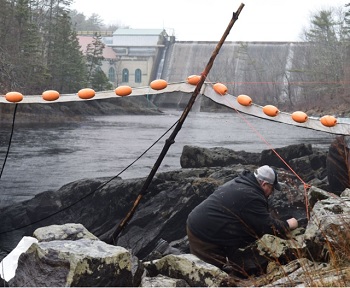
Maine: Elver price plummets; lobster industry seeks help
Earning a living as a fisherman is tough in the best of times. Right now, times are bad and Maine fishermen have to hope they don’t get any worse.
Last year, according to the Department of Marine Resources, Maine harvesters landed 9,620 pounds of elvers, juvenile eels, and dealers paid $20,119,194 for the catch, an average price of $2,091 per pound for the fishermen. Things are markedly different in this year of the coronavirus pandemic.,, Like elver harvesters, members of Maine’s lobster industry have experienced an extraordinary disruption of their fishery. Most lobsters are consumed in restaurants or other commercial settings,,, >click to read< 16:30

Amid escalating conflict, Ottawa orders temporary shutdown of Maritime elver fishery
The multimillion-dollar elver fishery in Nova Scotia and New Brunswick has been shut down amid escalating conflict between commercial and Indigenous harvesters, according to an industry representative. Riverside disputes and threats of violence during the spring elver fishery in 2020 rose to the point where local police intervention was required,,, The order says estimated elver removals were “far above the established catch limits in areas where fishing is occurring, which represents a threat to the conservation and protection of the species.” >click to read< 07:28
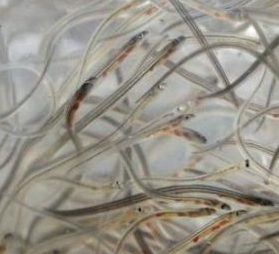
Maine elver fisherman dealing with lower eel prices during the coronavirus crisis
Elvers were often worth less than $200 per pound until 2011, when international sources of the eels dried up and the Maine price jumped to nearly $900 per pound. They’ve been worth more than $800 every year since, and hit a high price of more than $2,360 in 2018. Some fishermen call the elvers “wriggling gold,” but this year, the catch is only selling for about $500 per pound. Industry members are blaming concerns about the coronavirus for the plummeting prices. “We’re just going to the river and we’re going straight home,” said Julie Keene, an elver fisherman from the Lubec area. “Price is a lot less than normal. I think we’ve been greatly affected.” >click to read< 10:25

Elver Lottery to Allow New Entrants into Maine’s Lucrative Elver Fishery
Nine Maine residents will soon have a chance to join the state’s lucrative elver fishery. The Department of Marine Resources will hold a lottery, starting at noon Thursday, January 16, for the right to apply for an elver license. The lottery will be available through 4:30 pm February 21, providing lottery winners the chance to apply for a license prior to the upcoming season, which starts March 22 and runs through June 7. >click to read, details, links< 16:18
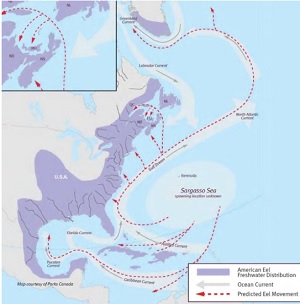
Inside the secret, million-dollar world of baby eel trafficking
In the parking lot of an Irving gas station in Aulac, N.B., not far from the Nova Scotia border, Curtis Kiley popped the trunk of a Toyota Corolla. Inside was a white bucket containing what looked like a giant hairball, the type that might be pulled from a bathtub drain. Except it was alive — a wriggling, slithering mess. This was just an initial sample Kiley had brought to show a prospective black-market buyer, a woman he knew only through text message as “Danielle.” He was ultimately hoping to unload up to 300 kilograms of the tiny creatures, a huge haul worth $1.3 million on the open market, but one he was offering at a steep discount. Moments later, Kiley’s world turned from dollar signs to handcuffs. >click to read<10:40
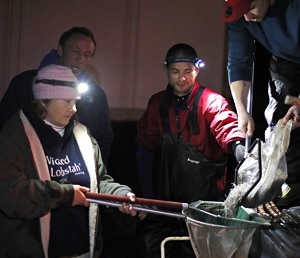
Maine’s first elver eel season with new controls going well
Maine’s baby eel fishermen are enjoying a steady harvest and strong prices during the first season in which regulators are using new controls to stop poaching .,,, “For the guys who want to do the right thing and grow this fishery, they’re happy to comply,” said Jeffrey Pierce, a former state legislator who is an adviser to the Maine Elver Fishermen Association.,,, Fishermen are more than 90% of the way through their quota for the year, which is slightly less than 10,000 pounds (4,536 kilograms). The average price is more than $2,000 per pound, which would be the third highest average on record if holds,,, >click to read<18:33
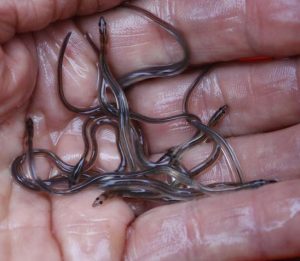
Why Maine Is The Only State In The US With A ‘Significant’ Elver Fishery
If you’ve ever read a story in the news about elver fishing season, you’ve probably seen some variation of this line: “Maine’s the only state in the U.S. with a significant fishery for elvers.” Maybe you thought that’s because elvers don’t exist in large numbers outside of Maine — that would be a reasonable assumption. But the real reason is somewhat more complicated. Let’s start at the beginning, in the Sargasso Sea. Although it sounds romantic, the Sargasso Sea is actually just an area of the North Atlantic that’s full of Sargassum,,, >click to read<14:56

Maine baby eel harvest on pace to hit record value under catch limits
Halfway through the 2018 fishing season for baby eels, the value of landings in Maine is on track to reach its highest annual total since a statewide catch limit was imposed four years ago. With the average price remaining above $2,300 per pound since opening day on March 22, the value of the statewide catch so far was $12 million as of Thursday evening. That’s just $130,000 shy of the catch value for all of 2017. It represents 4,600 pounds caught statewide since the season started, meaning fishermen have not yet reached the halfway point of Maine’s overall annual catch limit of 9,688 pounds. >click to read<10:24

Elver prices soar to new heights amid shortage, Asian demand, state expects a strong year.
The price of baby eels in Maine is soaring to record highs at the start of a season in which buyers expect to pay more for the valuable fish.,, Fishermen in Maine, which has the only significant elver fishery in the U.S., are poised for high prices this year because of a poor harvest in Asia. The early part of Maine’s season has been held back somewhat by bad weather, but harvesters are looking forward to a good year, said Darrell Young, co-director of the Maine Elver Fishermen Association. >click to read< 09:55

Price offered for Maine’s baby eels hits record high
Strong demand for baby eels from Maine, spurred by poor winter harvests elsewhere around the globe, has driven prices in the opening days of the state’s annual fishing season to unprecedented heights. The average price offered to fishermen for their baby eels, also known as elvers, since the season began at noon last Thursday is between $2,700 and $2,800 per pound, according to Maine Department of Marine Resources. That’s the highest average price range ever reported by the state agency and more than double the $1,302 per pound that Maine fishermen averaged over the course of the 2017 season. >click to read<09:07
Maine elver king to plead guilty to trafficking in poached elver eels
 The man regarded as the founder of Maine’s elver fishery will plead guilty to violating federal law by trafficking in more than half a million dollars worth of poached baby eels. Bill Sheldon and federal prosecutors reached the agreement on Sunday. Sheldon has waived his right to appeal any sentence that includes a prison term of 30 months or less. Sheldon bought elvers, or baby eels, that he knew had been caught in New Jersey and Virginia, where the fishery is banned, prosecutors have said.,, Sheldon, 71, of Woolwich, is scheduled to appear in federal court in Portland at 12:30 p.m., Thursday, Oct. 5, to formally enter his guilty plea. click here to read the story 14:37
The man regarded as the founder of Maine’s elver fishery will plead guilty to violating federal law by trafficking in more than half a million dollars worth of poached baby eels. Bill Sheldon and federal prosecutors reached the agreement on Sunday. Sheldon has waived his right to appeal any sentence that includes a prison term of 30 months or less. Sheldon bought elvers, or baby eels, that he knew had been caught in New Jersey and Virginia, where the fishery is banned, prosecutors have said.,, Sheldon, 71, of Woolwich, is scheduled to appear in federal court in Portland at 12:30 p.m., Thursday, Oct. 5, to formally enter his guilty plea. click here to read the story 14:37
Species At Risk? Eel decline in Quebec and Ontario could end industry in Maritimes
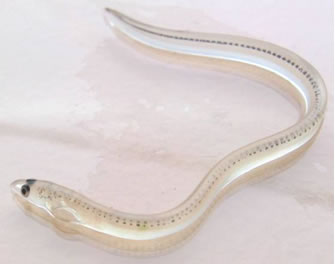 An effort to protect eels in Ontario and Quebec is threatening to shut down the little known but lucrative eel fishery in Nova Scotia and New Brunswick. “What is at stake is the livelihood of people in rural Nova Scotia,” said Yvonne Carey of Atlantic Elver Fishery, one of eight Nova Scotia eel fishery licence holders. Another licence is in New Brunswick. Between 130 and 140 people are employed each year netting adult and baby American eels as they enter and leave rivers in the two provinces. This week in Dartmouth, officials from the Department of Fisheries and Oceans will review data collected on those rivers as part of a to decide whether the Maritime eel population is really at risk. The department is considering a recommendation from wildlife experts to declare American eels a species at risk. Read the story here 14:41
An effort to protect eels in Ontario and Quebec is threatening to shut down the little known but lucrative eel fishery in Nova Scotia and New Brunswick. “What is at stake is the livelihood of people in rural Nova Scotia,” said Yvonne Carey of Atlantic Elver Fishery, one of eight Nova Scotia eel fishery licence holders. Another licence is in New Brunswick. Between 130 and 140 people are employed each year netting adult and baby American eels as they enter and leave rivers in the two provinces. This week in Dartmouth, officials from the Department of Fisheries and Oceans will review data collected on those rivers as part of a to decide whether the Maritime eel population is really at risk. The department is considering a recommendation from wildlife experts to declare American eels a species at risk. Read the story here 14:41
Seven plead guilty to illegal Elver Eel trafficking
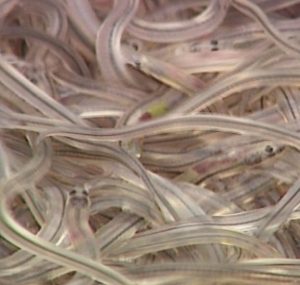 Seven people pleaded guilty to federal charges of trafficking nearly $2 million worth of baby eels on the East Coast. The pleas took place between Tuesday and Thursday at federal court in Portland. Six pleaded guilty to selling or transporting illegally harvested elvers in interstate commerce. Elvers can only be fished commercially in Maine and South Carolina and are one of the country’s most lucrative fisheries on a by-the-pound basis. They are sold to Asia and used for sushi. The six who pleaded guilty to selling or transporting the elvers were Yarann Im, Mark Green, John Pinkham, Thomas Reno, Michael Bryant and George Anestis. Thomas Choi pleaded guilty to exporting elvers that he knew had been harvested illegally. The charges carry a maximum of five years in jail. link 08:30
Seven people pleaded guilty to federal charges of trafficking nearly $2 million worth of baby eels on the East Coast. The pleas took place between Tuesday and Thursday at federal court in Portland. Six pleaded guilty to selling or transporting illegally harvested elvers in interstate commerce. Elvers can only be fished commercially in Maine and South Carolina and are one of the country’s most lucrative fisheries on a by-the-pound basis. They are sold to Asia and used for sushi. The six who pleaded guilty to selling or transporting the elvers were Yarann Im, Mark Green, John Pinkham, Thomas Reno, Michael Bryant and George Anestis. Thomas Choi pleaded guilty to exporting elvers that he knew had been harvested illegally. The charges carry a maximum of five years in jail. link 08:30
Holy Smoke! Elver prices rise to around $1,900 per pound
 Expectations for the volume of elvers that will be caught in Maine this spring may be low but, based on prices that dealers are offering fishermen, the value of the fishery could be headed back up to what it was a couple of years ago. The snow and cold spring temperatures are keeping landings to a trickle so far this season, but for fishermen who are catching baby American eels, the price is back up,,, Read the rest here 09:25
Expectations for the volume of elvers that will be caught in Maine this spring may be low but, based on prices that dealers are offering fishermen, the value of the fishery could be headed back up to what it was a couple of years ago. The snow and cold spring temperatures are keeping landings to a trickle so far this season, but for fishermen who are catching baby American eels, the price is back up,,, Read the rest here 09:25
UPDATED: Maine’s elver-fishing industry could be affected by new regulations – harvest to be cut by 25% in 2014
 The American Eel Management Board of the Atlantic States Marine Fisheries Commission is meeting Wednesday in Georgia to discuss and possibly vote on new regulations. Options range from maintaining the status quo to imposing quotas to closing the fishery. more@kennebecjournal 12:12 new info here
The American Eel Management Board of the Atlantic States Marine Fisheries Commission is meeting Wednesday in Georgia to discuss and possibly vote on new regulations. Options range from maintaining the status quo to imposing quotas to closing the fishery. more@kennebecjournal 12:12 new info here






